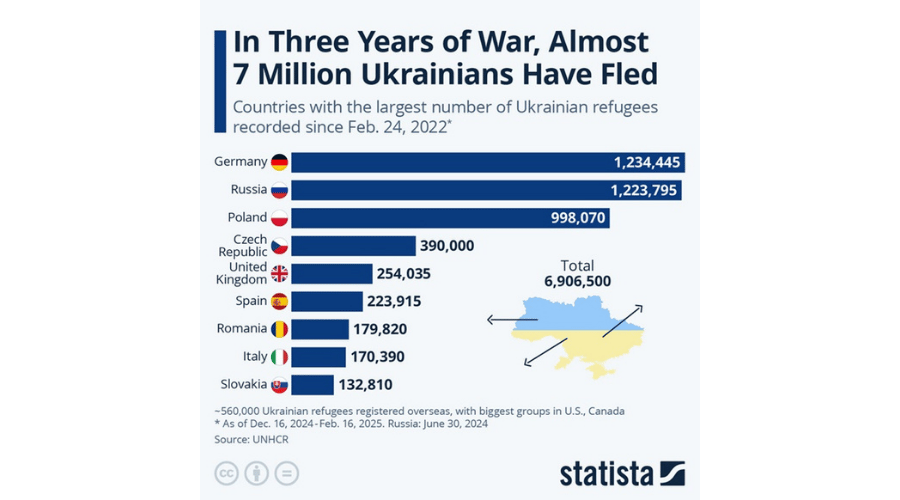Refugee homelessness and the UK response to world crises
As well as the latest news on the 56-day move-on period for refugees with successful claims, there is new funding to help local authorities to provide more refugee accommodation. There are also major shifts in government policy towards those who have escaped crisis countries such as Afghanistan and Ukraine, while claims from Syrian asylum seekers are, at last, being processed. Here is the latest news.
56-day move-on period from asylum accommodation extended
Announced by Angela Eagle at the LGA conference, the 56-day pilot, due to end in July, will continue until the end of the year. Home Office minister Seema Malhotra said, in answer to a question on June 13, that “It is important that we take the necessary time to evaluate the impact of the interim measures, including overall net costs to taxpayers, before making a decision on whether to make the measures permanent.”
The National Centre for Social Research (with consultancy RSM) is conducting the evaluation of the pilot, as well as the effectiveness of Asylum Move On Liaison Officers (AMLOs) and extra move-on grant funding. They want to hear views from those involved in the move-on process, including councils, housing providers, recently granted refugees and bodies assisting them. They plan to hold focus groups, local interviews and an online survey. The evaluation runs until August.
The researchers can be contacted via MoveOnEvaluation@natcen.ac.uk or by calling 0808 281 0308.
Baroness Lister’s Bill which would make the 56-day period permanent reached its committee stage in the House of Lords, where there was an extensive debate.
One of this quarter’s articles describes efforts to prevent refugee homelessness in Greater Manchester. An article by housing rights editor John Perry, in the Big Issue, looks at measures that local authorities can take to reduce homelessness among those leaving asylum accommodation.
Extra funding for refugee accommodation
A new phase of the Local Authority Housing Fund was announced in the Spending Review. A further £950 million will be provided between 2026/27 and 2029/30, with details to be announced later. Previous phases of the fund have been used by local authorities to provide accommodation for refugees, so it might also be part of this new phase. Councils have used it both to build new homes and to acquire them (see examples in past newsletters).
London Integration and Housing Pathways Service now open
The Refugee Council’s London Integration and Housing Pathways Service (LIHPS), now open for referrals, replaces the Refugee Advice Project and Private Rented Scheme, both now closed.
LIHPS accepts referrals from clients in London who have received refugee status within the last six months. The service supports newly recognised refugees who are homeless or at risk of destitution for short- to medium-term crisis intervention. It provides specialised advice on housing and benefits issues during the transition from Home Office support to accessing mainstream support through DWP, local authorities, supported accommodation providers etc.
If a client is within this remit, please download and complete the referral form on the Refugee Council website and email it to londonintegration@refugeecouncil.org.uk. The referral form and more details of LIHPS can be found here.
Responses to world crises
Ukraine: Refugees face homelessness problems as hosting arrangements end
Homelessness research by the British Red Cross reveals a “hidden crisis” for Ukrainians. Findings show displaced Ukrainians remain more than twice as likely to experience homelessness as the general UK population. The research identified unachievable deposits, unaffordable rents, and a lack of guarantors as key challenges. Short-term visas also interfere with job prospects and are unattractive to landlords. Mubeen Bhutta has a blog expanding on the report.
There is also a growing number of refusals of asylum claims from Ukrainians, even those from places destroyed in the war, on the grounds that they could move to safer, western Ukraine. Free Movement looks at the details.
The government’s three schemes have brought over 250,000 Ukrainians to the UK. You can see details of the help available on the housing rights website – the page has been recently updated
Data on homelessness among those housed under the Homes for Ukraine (HFU) or family schemes in England are provided here. By the end of April, 11,700 households had been dealt with as homeless, two-thirds of them (around 7,800) because hosting arrangements under the HFU broke down or ended (the figures are likely to be underestimates, as many councils are not submitting data).
The government is also producing statistics on Ukrainians in employment. By March 2025, some 49,450 were in work.
Chay Bowes (@BowesChay) noted that of the seven million Ukrainians who have fled the country, half have fled to Germany, Russia and Poland (see chart). The Financial Times looks at the data showing that in many countries Ukrainians have jobs and that a growing proportion do not want to return to Ukraine.

Do read the newsletter article by Ukrainian refugee, Mariia Krapivini, on her experience of three years in the UK.
Syria: Response to the crisis and the new regime
Since last December, all asylum cases from Syrian nationals have been paused, leaving about 7,000 people in limbo. This changed on July 14, when the government announced it will resume dealing with claims using new country guidance. Free Movement commented:
“It seems likely that the Home Office will now be trying to refuse any asylum applications from Syrians where they can. Scrutiny of the new country notes to identify who is still accepted to be at risk will be necessary for those working on these cases, and where the Home Office’s evidence is not supportive of risk to certain groups, it will be sensible to carry out research to confirm whether or not that position is correct.”
Syrian asylum seekers, represented by law firm Duncan Lewis, had threatened the Home Office with legal action if the decision had not been reversed. Meanwhile, in Syria, there were plentiful reports of continuing violence and persecution.
Afghanistan: News on resettlement and on Afghan asylum seekers
A scandal erupted in mid-July over a “secret” resettlement scheme for Afghan people who worked with the British authorities and whose lives were at risk because of a data breach. Some 4,500 have arrived in the UK or are travelling under the scheme, with a potential further 2,400 who have not yet travelled. This brings the total of all Afghan refugees in the country or travelling to the UK, to 39,200.
The government also unexpectedly announced the closure of the Afghan Relocations and Assistance Policy (ARAP) on July 1. The government now considers ARAP to have fulfilled its original purpose, and that closure will allow resources to be refocused on national security priorities. Since its launch over four years ago, the scheme has brought more than 21,000 Afghan principals and their family members to the UK. Ministers claim that 95 per cent of applications under the scheme are now ineligible.
Home Office minister Seema Malhotra summarised the changes in a written statement. This is the updated gov.uk page.
A total of 3,880 Afghan people are awaiting permanent homes after being brought to the UK under ARAP, reports The Independent. This number is up from the 3,035 reported in September 2024 and includes nearly 2,000 children. They are living in temporary housing, including hotels and military bases, while permanent homes are found.
The resettlement scheme helps Afghans who supported Britain and aims to protect those facing persecution from the Taliban. The number of Afghans resettled under the scheme rose 17 per cent in the year ending March 2025, totalling 7,736 people.
Free Movement comments on the dire situation facing Afghan women seeking asylum. Noting that immigration statistics show that 26 Afghan women have had their asylum claims refused, the article says it is “unbelievable that the Home Office was refusing female asylum claims in the climate in which the Taliban are imposing increasing restrictions on women in Afghanistan.”
The BBC highlights the case of a special forces officer who blocked 1,585 Afghans from coming to the UK.
The government has a new guide, Find Your Own Accommodation, to help resettled Afghan families transition from temporary housing to the private rental sector. It is available in English, Dari, and Pashto.
Iran: Commonest country of origin of asylum seekers in the UK
The conflict between Israel and Iran has prompted questions about the potential impact of protracted violence on refugee movements in the region, as well as to the UK. In recent years, Iran has been the most common country of nationality among asylum applicants and small boat arrivals to the UK, and the UK has been the most common European destination for Iranian asylum seekers. At the time of the Census in 2021/22, there were around 114,000 Iranian-born people living in the UK.
This commentary from the Migration Observatory examines data on Iranian migration to the UK through seven charts.
Palestine: Two children allowed into the UK to have medical treatment
The Observer met two children, Rama and Ghena, who have been allowed to enter the UK to receive medical treatment. The families arrived in London at the end of April, the first – and, so far, only – children from Gaza to be given visas for medical treatment in the UK since war began in October 2023.
On 30 June, 67 MPs from across Parliament — including former ministers, Labour MPs, independents, Greens, Lib Dems and SNP members, together with members of the House of Lords — signed a letter calling for a Gaza Family Scheme, a safe route for Palestinians trapped in Gaza to reunite with relatives in the UK, “until it is safe to return.”
“Just as the UK opened its doors to those fleeing persecution in Ukraine and Hong Kong, we believe the same generosity should be extended to Palestinian families,” the letter says.
Positive Action in Housing, based in Glasgow, is asking for support for their campaign to secure a Gaza Family Scheme.
Hong Kong: Latest visa numbers
The East Midlands Councils quarterly briefing notes that, on the BN(O) visa route for people from Hong Kong, since January 2021 to end of December 2024, there have been a total of:
- 182,652 out-of-country visa applications, with 18,916 in 2024
- 176,714 out-of-country visas granted, with 19,273 in 2024
- 161,200 people have arrived in the UK (rounded), with 20,700 in 2024
- 45,468 in-country extension applications with 9,030 in 2024
- 43,205 in-country extensions granted, with 9,641 in 2024.
British Futures has a new research study on Hong Kongers’ new lives in Britain.
Across Europe, immigration policy is toughening
The New York Times points out that it is not only Trump’s USA that is being tough on immigrants. Ursula von der Leyen, president of the EU executive, says that Europe must “insist on strengthening border management.” According to Martin Hofmann, an adviser at the International Centre for Migration Policy Development, “There is now this really broad consensus among almost all political camps. We will be tougher, we will be stricter.”



